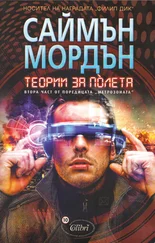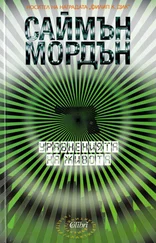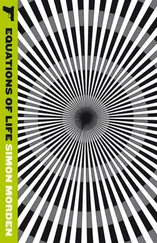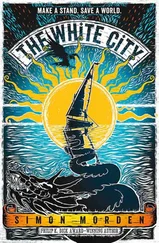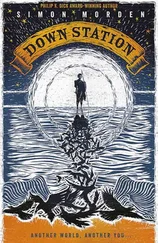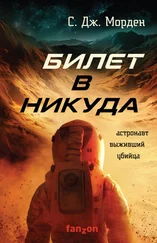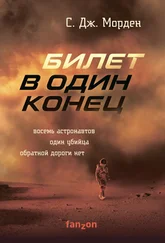“Neither did I, but I suppose we ought. I’ll buy.”
“You’re going to have to. Your idea of a regular allowance is once every six months.” She looked at him. “Anyway, since when have you had to pay for anything?”
“Yeah. Okay, so let’s go out and see what we can scrounge.”
They left the arts college, pushing back out through the plastic and onto the street. Petrovitch interrogated the local area for somewhere serving food: the nearest was their “usual,” the works canteen in the middle of the Hyde Park building site.
The man watching the main gate threw a couple of hard hats at them, waving them through before Petrovitch was able to explain his mission. But it was like that most places he went in the Freezone: he had the grace to feel faintly embarrassed, while Lucy took it as her right.
“It’s cold,” she said, balancing across a line of duck-boards. “Never used to be this cold.”
“The Metrozone made its own weather. It will do again. Next winter here won’t be like this one.”
“And where will we be next winter?”
“Difficult to say,” said Petrovitch. “We have options. Would you want to stay here, after the Freezone packs up?”
“I don’t know. There’s not much left for me here. There’s the house, I suppose.” The house; not her house or her parents’ house, not even home. “Maybe I should sell it to someone else. It’s in good condition.”
“You could keep it, too.”
“I think,” she said, “that I wouldn’t be comfortable living there whatever I decide to do.” Lucy glanced back at Petrovitch. “I’d keep thinking about what I saw out of my bedroom window.”
“Ah. Fox.”
“Yes. Him.” She carried on, seemingly more at ease with the howl of metal grinders and the actinic white glare of welding torches than quiet suburbia.
Ahead were prefab huts, jacked up on pylons to be clear of the mud—purpose built, not converted domiks. Windows ran with condensation and pearled the artificial light inside. The exhaust from an extractor blew cooking smells at them with the force of a gale.
“So, salad not on the menu again.”
“Yeah, well. It’s not like I have a heart to worry about anymore.” Petrovitch held the door open for her, and she stepped inside, flipping her hard hat into her hand.
They were greeted like heroes, and Lucy was right: he never had to pay for anything, and neither did she. The construction workers were honored to merely sit and eat with the two. They crowded around, joining tables, moving chairs, taking far longer over their second mug of coffee than their agreed break allowed.
They asked him questions—on any subject, because he always had an opinion—and he answered them between mouthfuls of bread, bacon, sausage and beans, waving his fork around when he needed emphasis.
In the corner of the room, unwatched, a flat-screen monitor showed a tall column of milled steel rising and falling in the center of a crude octagonal base. A voice-over expressed wonder, fear, uncertainty—but no one in the room was listening to the news reader as she stumbled over her explanation of an over-unity engine. At some point, a talking head, someone only Petrovitch would have recognized, appeared to discuss the finer points of the laws of thermodynamics.
And even he was lost when the crowd around the table parted to let Madeleine through.
She stood there at one end of the long canteen table, Petrovitch sat at the other with Lucy. Silence flowed from her like a cold, heavy stream until the whole room was flooded with it.
Petrovitch pushed his plate away and leaned back in his chair. Lucy looked first at Madeleine, then at Petrovitch, trying to judge the mood. She sensed that something had changed, and she put down her fork to gently lay her hand on her ersatz-father’s forearm.
Petrovitch glanced at her from the corner of his eye, and she shook her head slightly. So, no argument today. Perhaps.
It had started with one thing, and had snowballed from there: he hadn’t told her about Michael. He’d kept it a secret for all kinds of reasons, and all of them, he thought, good. He hadn’t cheated on her. He hadn’t neglected her. He’d even fought his way through a city in flames to save her. If there was any way left for him to demonstrate his love for her, he was open to suggestions. She was Mother to everyone, but wife to none.
She didn’t live with him. She didn’t live anywhere, except on her bike. She traveled around the Freezone, appearing un-announced at work camps and building sites, intent on keeping everyone honest.
Petrovitch saw her every other day or so. It might have been her way of checking up on him, keeping him honest too. She never announced her visits to him, either. But in eleven months, she’d never found him compromised, while showing no sign of coming back to him.
And now she wasn’t saying anything, the silence stretching to breaking point. Someone was going to giggle, or fart, and from the expression on her face, she wasn’t in the mood for levity.
“You can just call me. I’ll come. And you know that.”
“Yes. I know,” she said. “Can we step outside for a moment?”
“Just me?”
“Just you, Sam.” Her motorbike leathers creaked as she adjusted her stance. “Is that all right?”
He couldn’t read her. He turned slightly to Lucy. “You going to be okay on your own for a bit?”
“I’m hardly on my own. I’ll be fine. Go, go.”
He pushed back his chair with a scrape. “Thank you for your company, ladies and gentlemen.”
They watched him follow Madeleine out of the canteen, and only as the door started to swing shut did the murmur of conversation start up again.
She didn’t stop, though. Her bike was on the far side of the site, up by Lancaster Gate. She strode, and Petrovitch had to jog to keep up with her long-legged strides.
“Where’s the fire?”
“Who said anything about a fire?” she said. She was breathless, and something was wrong.
“Yeah. You going to tell me now, or do I have to work it out?”
“Neither. I’ll show you.”
“So there is a fire.”
“Will you…” She almost broke step, as did her voice. “Just hurry.”
They arrived at the gate. Petrovitch was going to wait for the guard to open the barrier: Madeleine vaulted it and went over to her bike, hastily abandoned in the middle of the road. She beckoned urgently to him.
“Sorry,” he said to the bemused security man and ducked under the rising metal pole. Madeleine threw a helmet at him, which he caught unerringly even in the glare and shadows of the site’s floodlights. The speed at which it came knocked him onto his back foot.
She hadn’t noticed. As soon as the helmet left her hand, she was astride the bike, kicking up the stand, starting the engine with a press of her thumb.
“Aren’t you putting one on too?”
“That is mine. Get on.” She throttled the engine and made the turbine whine. “And hold tight.”
He dropped the helmet on his head, where it slopped around loosely, and tried to work out how—and where—to sit.
“Just, just get on, Sam. Please.”
He hopped his leg over and eased himself down behind her. There was a grab rail behind him, but if she was going to ride as recklessly as he thought she would, that wasn’t going to be much use. Tentatively, he put his arms around Madeleine’s waist and caught his fingers together.
She momentarily stiffened, then shivered. Then she hauled on the accelerator like the very gates of Hell were opening somewhere and she had to go and stand in the breach.
Petrovitch almost lost his grip. He clung on for his life, and held her closer than he’d done in almost a year.
Читать дальше
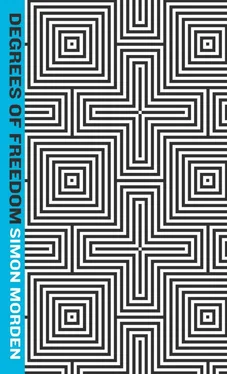
![Саймон Морден - Билет в никуда [litres]](/books/388091/sajmon-morden-bilet-v-nikuda-litres-thumb.webp)
![Саймон Морден - Билет в один конец [litres]](/books/395533/sajmon-morden-bilet-v-odin-konec-litres-thumb.webp)

